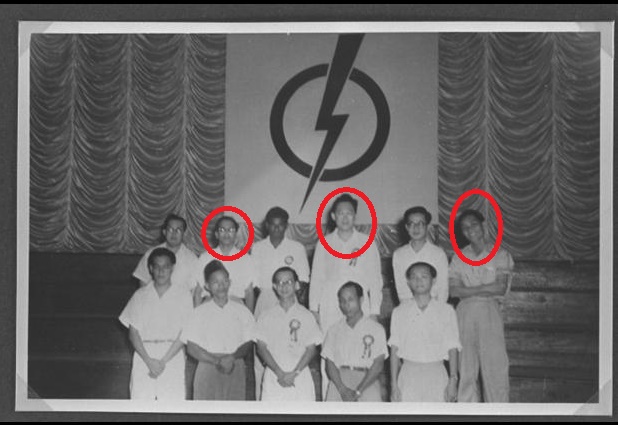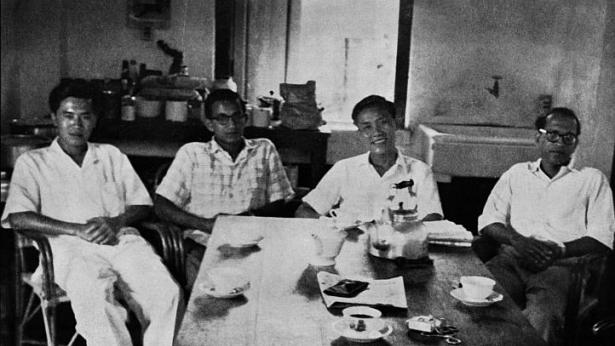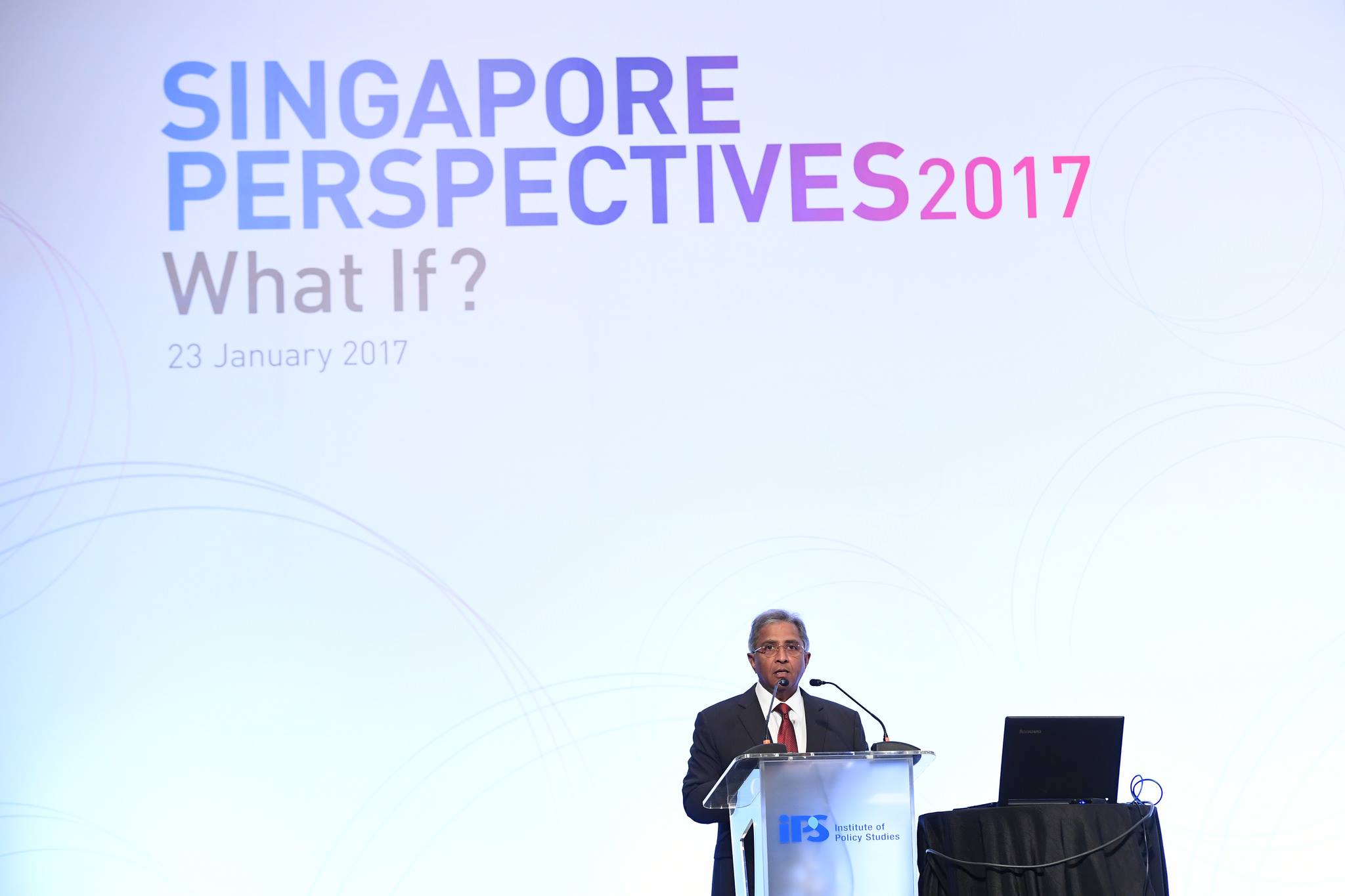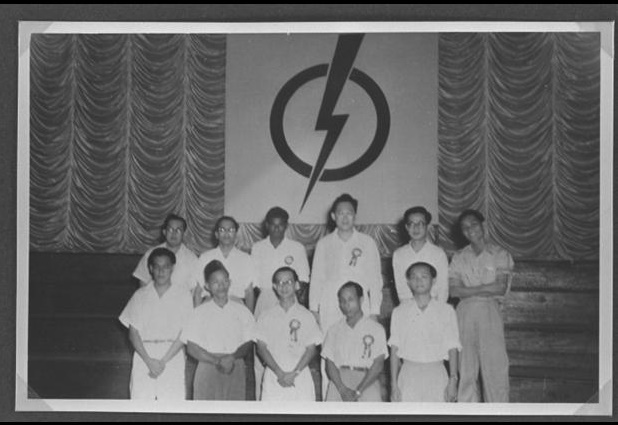Politics is a "tough business" - you can hurt relationships and damage deep friendships. Differences might not be reconciled, even when the issues causing them no longer matter.
Fong Swee Suan, a founding member of the People's Action Party (PAP) and a former leftist trade unionist, passed away last Saturday (Feb. 4), aged 85.
Fong, together with Lim Chin Siong, left the PAP in 1961 to form the Barisan Sosialis, as they fought over their differences in views about Singapore's merger with Malaya.
Many of the founding members of the PAP - Lee Kuan Yew, Toh Chin Chye, Goh Keng Swee, Devan Nair, S. Rajaratnam - are no longer around to pay tributes to Fong or offer their condolences to Fong's family.
Lee (circled in the middle) died in 2015 at the age of 91, while Devan (circled on the left) passed away in 2005 at 82.
 Source: PAP's inaugural meeting at Victoria Memorial Hall History SG website.
Source: PAP's inaugural meeting at Victoria Memorial Hall History SG website.
Where is Fong in the photo? He is the suave looking gentleman circled on the right.
Enter Prime Minister Lee Hsien Loong and Chief of Government Communications Janadas Devan, as they evoked the styles and memories of their late fathers with notes of condolences to Fong's family and tributes to Fong.
1. PM Lee: "[I] mportant to realise that this was not a battle between good men and women on one side, and crooks and charlatans on the other. There were dedicated, disciplined, deeply courageous people on both sides", Facebook post, Feb. 6.
Here, we summarise PM's letter to Madam Chen Poh Cheng, Fong's wife:
- He offered his condolences to Chen.
- He provided a short history of PAP, PAP's split that resulted in the formation of Barisan Sosialis, PAP and Barisan's battle for/against merger with Malaya, as how the late LKY would have recounted in his memoirs.
- He helped Singaporeans make sense of Singapore's difficult history as many "did not live through the events to appreciate the passion of those times".
- He highlighted that it "was a serious battle of ideas between two groups of people with diametrically opposed visions of our society".
- He also took care not to "demonise" those who did not agree with the PAP by saying that the battle was not "between good men and women on one side, and crooks and charlatans on the other. There were dedicated, disciplined, deeply courageous people on both sides".
- He shared what he thought his late father would say, by highlighting his late father's views on Fong's friend Lim Chin Siong: "Mr Lee recalled in his obituary note on Mr Lim Chin Siong in February 1996 that his differences with Mr Lim were ideological and deep, but never personal. He would have said the same of Mr Fong".
- He recalled the last meeting between his late father and Fong in 2009, as "they shook hands warmly, and stood next to each other for a photograph".
PM's letter to Chen in full:
Dear Mdm Chen,
I am sorry to learn of the passing of your husband, Mr Fong Swee Suan. Mr Fong Swee Suan was a convenor of the People's Action Party when it was formed in November 1954 and a member of its first Central Executive Committee. He and Mr Lim Chin Siong had joined Mr Lee Kuan Yew's "Oxley Road" group earlier in the year to discuss the formation of a political party. Almost wholly English-educated, the non-communist group led by Mr Lee found in Mr Lim and Mr Fong a bridge to the Chinese-educated world - "a world teeming with vitality, dynamism and revolution," as Mr Lee put it in his Battle for Merger talks, "a world in which the Communists had been working for decades with considerable success."
The two sides, the non-communists and the pro-communists, joined forces to rid Singapore of the British colonialists, knowing full well that the real battle would come after the British left and Singaporeans had to decide who was to govern them.
Mr Fong and his pro-communist colleagues were arrested by the colonial authorities in October 1956 after a series of strikes and riots paralysed the island.
Mr Lee had to act as the detainees' lawyer, and would visit them at St John's Island every three or four weeks. I remember regularly taking a police boat together with my parents from the Master Attendant's Pier at Collyer Quay to St John's Island. My mother would bring along a pot of chicken curry and freshly baked bread for the detainees. It was a long walk from the jetty on the island to the house where they lived. I knew them by name, having met them when they came to Oxley Road, probably during election campaigns.
For me the trips to St John's Island were Sunday outings. But for my father there was a serious purpose. My father spent hours trying to persuade the detainees of the folly of the Communist Party of Malaya's policy. In the end, all the detainees signed a document, The Ends and Means of Socialism, which they themselves had drafted, setting out their support for the non-communist objectives of the PAP.
In 1959, Singapore attained self-government. The PAP won the general election, and formed the government. Mr Lim, Mr Fong and six other detainees were released from prison. Mr Lee and his senior colleagues were hopeful that all but Mr Lim were sincere in their declarations of support. He appointed the detainees as Political Secretaries in various ministries. Mr Fong went to the sensitive Ministry of Labour. In the end only one detainee, Mr Devan Nair, remained true in his pledge.
The inevitable parting of ways came in June 1961, over the question of Merger with Malaya to form the new Federation of Malaysia. The split was precipitated by the decision of the "Big Six" trade union leaders, including Mr Lim and Mr Fong, to oppose the PAP at a by-election in Anson. The pro-communists formed the Barisan Sosialis, with Mr Lim as its Secretary-General, and the Singapore Association of Trade Unions, with Mr Fong as its Secretary-General.
A ferocious battle for hearts and minds ensued. In the Referendum of September 1962, the option for merger recommended by the PAP won 70 per cent of the vote. Later in the general election of September 1963, the PAP was re-elected to office with 37 out of 51 seats, with the Barisan winning 13.
It is difficult for Singaporeans who did not live through the events to appreciate the passion of those times. This was a serious battle of ideas between two groups of people with diametrically opposed visions of our society. Singapore's history would have been utterly different if Mr Lim and Mr Fong had prevailed. Fortunately, they did not, as several of those who took their path recognised later, after the dust had settled.
But it is important to realise that this was not a battle between good men and women on one side, and crooks and charlatans on the other. There were dedicated, disciplined, deeply courageous people on both sides. Indeed, Mr Lee and his colleagues liked and respected their opponents, admiring them for their simple lifestyles, selflessness and commitment. Mr Lee recalled in his obituary note on Mr Lim Chin Siong in February 1996 that his differences with Mr Lim were ideological and deep, but never personal. He would have said the same of Mr Fong.
Mr Fong and Mr Lee met for the last time in September 2009, in the chamber of the old Parliament House, where the PAP and Barisan Sosialis had crossed swords in those tumultuous years half a century earlier. The occasion was the book launch of "Men in White", a history of the PAP. They shook hands warmly, and stood next to each other for a photograph.
As Mr Lee wrote, it was precisely because the PAP had such opponents, that he and his colleagues learnt "the meaning of dedication to a cause":
"They were prepared to sacrifice everything for their cause, and many did. Some lost their lives in the jungle, many were banished to China. Because of the standards of dedication they set, we, the English-educated PAP leaders, had to set high standards of personal integrity and spartan lifestyles to withstand their political attacks. They were ruthless and thorough. We became as dedicated as they were in pursuing our political objectives."
Please accept my sincere condolences.
Yours sincerely
Lee Hsien Loong
 Photo taken by the late Lee Kuan Yew. Source
Photo taken by the late Lee Kuan Yew. Source
A photo of Lim Chin Siong, S. Woodhull, Fong Swee Suan and Devan Nair.
2. Janadas Devan, "A tribute to father's old friend Fong Swee Suan", ST Forum, Feb. 6.
 Source: IPS Commons Facebook.
Source: IPS Commons Facebook.
Here, we summarise Janadas' letter:
- He called Fong his father's "Chinese brother". When both were in prison, Fong taught Devan Chinese, while Devan taught Fong English.
- He shared two accounts of how close his late father and Fong were -- 1) A simple dinner between the Devan and Fong family, just a few months before the PAP-Barisan split; and 2) how Devan arranged for Fong's return to Singapore -- he was prohibited from doing so previously-- when Fong became ill.
- He also shared what he thought his late father would say, by highlighting his late father's views on Fong's friend Lim Chin Siong in a T.S. Eliot poem.
My father, Mr Devan Nair, and Mr Fong Swee Suan were close friends. Jailed together for three years from 1956 to 1959, my father was Mr Fong's "Indian brother", and Mr Fong, my father's "Chinese brother".
Many years later, Mr Fong recalled that he taught my father Chinese in prison, with little success; and my father taught him English, with a little more success.
As fortune would have it, when the People's Action Party (PAP) split in 1961, the two friends found themselves leading rival trades union federations - Mr Fong, the Singapore Association of Trade Unions, which was affiliated to the Barisan Sosialis; and Mr Nair, the National Trades Union Congress, which was affiliated to the PAP.
The parting of ways was painful for both men. But they never doubted each other's sincerity. They both knew the other was prepared to make the ultimate sacrifice for his beliefs.
One memory from my childhood that I have never forgotten was the simple dinner my parents gave Mr and Mrs Fong when they married. The event took place in our home a few months before the split, when the writing was already on the wall. Despite the bitter political battle that was looming, the two men retained great warmth for each other.
Many years later, in the mid-1980s, when Mr Fong became ill, my father arranged for him to return to Singapore for treatment.
Mr Fong was then living in Johor, and was prohibited from entering Singapore. The Singapore Government gave Mr Fong permission to return, and my father insisted Mr Fong stay with him in his home.
My father is no longer here to pay tribute to his old friend. But I know what would have been in his heart.
When Mr Lim Chin Siong, Mr Fong's close comrade, died in 1996, Mr Nair quoted these lines from T.S. Eliot's Little Gidding in his tribute to Mr Lim. The same lines express what would have been in my father's heart about his old friend, Mr Fong Swee Suan:
We cannot revive old factions
We cannot restore old policies
Or follow an antique drum.
These men, and those who
opposed them
And those whom they opposed
Accept the constitution of
silence
And are folded in a single party.
Whatever we inherit from the
fortunate
We have taken from the defeated
What they had to leave us - a symbol:
A symbol perfected in death.
Janadas Devan
Top photo from History SG website.
If you like what you read, follow us on Facebook and Twitter to get the latest updates.
If you like what you read, follow us on Facebook, Instagram, Twitter and Telegram to get the latest updates.
